#btvs analysis
Explore tagged Tumblr posts
Text
Something I just realized after watching some of Angel s1 is that Angel and Riley are kind of similar. I don't know if it was on purpose or not, but they seem kind of like mirrors of each other in a way, or they have similar ideas of what it means to be dating Buffy. Riley, as we know, struggled a lot with the fact that he's a human and Buffy isn't. At first, they work together to defeat monsters and he believes that she's just a strong girl. When he learns that she's supernaturally inclined to be stronger, he seems ok with it at first, a little surprised because he didn't originally believe in the Slayer. But over time he comes to this realization that Buffy doesn't need him to help her. She can handle herself, and if anything, he needs her to save him because she's the Slayer. She's the only one who can literally save the world because that's her job. All he's left with is being Buffy's boyfriend and not her protector, which as a male who grew up in the south and works for the military obviously damages his ego a little bit and messes up with his views on relationships. So when Buffy starts to distance herself from him when things get tough, he feels as if not only is he not needed to protect her, but he's not needed to just be her boyfriend. He has no real importance in her life, she has everything her own and he has no other way to impress her. So he seeks validation outside of their relationship with the vampire prostitution. He wants to be needed and relied on. He wants to be a tough man who has to save his woman, not the other way around. And if he can't do that let alone just be in Buffy's life, he leaves entirely. Which I think is fair, because obviously they have different needs and it was never going to work out for them. Now we get to Angel. In the first cameo episode we see of Buffy in Angel the show, Angel turns into a human for a while from demon blood and that's the whole plot of the episode. And we see that Angel goes through essentially the same thing. He realizes that he is not good to Buffy if he isn't as strong or stronger than her, that she doesn't need him if he can't protect her. Buffy doesn't care that Angel can't fight alongside her anymore, she's ecstatic that he's human and they can finally be together and she's willing to give up everything for them to live a normal life as humans together. But Angel's ego just can't handle that he wouldn't be able to save Buffy when he thinks she needs him to. Even though, usually when Angel does show up, she never needs his help regardless and it only causes her more pain. The whole reason she shows up in the episode, to begin with, is because Angel watches her from the sidelines because he believes he needs to protect and watch over her. Not only does he not really help, but he never talks to her at all before he leaves. And when Buffy finds out, she's hurt and upset because she feels betrayed that he feels he can just waltz into the shadows of her life and leave without saying anything to her. I think Angel just as a boyfriend isn't that great, and I think he knows this too, which is why he gives up his humanity the one thing Buffy wanted so that (in his mind) she could need him outside of just being someone for her to love. That he could be useful for something other than just being emotional support. Angel has never really helped Buffy in any of her physical fights, so the fact that he gives up his humanity just so he can have super strength again is ridiculous to me. It shows that he doesn't care about loving Buffy, he would ruin her happiness for his own ego. Neither Angel or Riley want to Buffy's, they want her to be theirs. They want her to be reliant on them because in some way it allows them to hold control and power over her because they can't handle that she has more power over them as a woman.
Now....here's where my Spuffy bias comes into play.
Spike knows that he is weaker than Buffy. And he's ok with that. if anything, that's what he loves about her. I mean, he actually tries to help Buffy in physical fights multiple times and usually, he just gets in the way and fails. (Which is more than Angel does IMO.) The difference is that Spike doesn't try and make himself stronger than he already is, he jumps in when he feels he can help and when Buffy tells him she doesn't need his help, sure he gets a little upset and embarrassed, but he steps out of the way. I've also noticed that usually when he jumps in, he sees that Buffy is struggling. At least in his own eyes. In a lot of those cases, she is struggling a little and Spike makes a distraction or knocks the attacker out of the way and Buffy just gets annoyed that he's there.
But that's not just it. Spike likes that Buffy overpowers him. He enjoys fighting with her. That's how he flirts, that's how they flirt. Buffy beats Spike to a pulp and he's honestly content. Even when she's so angry she beats his face bloody, he isn't sad or angry with her, he just says "you always hurt the ones you love the most" and is basically smiling. And the kicker here is that he doesn't even fight back. He rarely fights back. The only times he does fight back, they end up having sex. He doesn't need to overpower her or seem stronger than her. If anything, he's bluffing. Even souled Spike doesn't want to be stronger than Buffy or care about matching her level of power. The whole speech Spike gives her near the end of season seven proves that. He literally tells her that he doesn't love her because of how she looks beside him, or in his image. He doesn't love her in the way you'd love an object or ideal. He loves her for who she is and because she's a strong, independent woman who doesn't need him. He couldn't care if he was useful to her or not, sure he'd like to be--he tries to be as helpful as he knows he can be, but if she saved the world without his help he'd be happy to do so. The number of times where Spike helps Buffy the most by just letting her do the fighting while taking care of everything else behind the scenes for her shows how much better of a partner he is for Buffy. Spike is capable of helping Buffy physically, but he's best suited to helping the people she loves and emotionally. He's her punching bag and her shield in a way. Angel and Riley want to be the knight that protects Buffy because they want her to be a meek little girl who relies on them, but she is the one who is the sword.
They pair so well because they are essentially each other's yin and yang. Buffy is the sword, she is the knight charging forward on her own, and Spike is her shield. He holds the fort and is only useful when she needs him to be instead of needing to be useful.
I really hope this made sense. I literally cannot get their dynamic out of my head. I needed to rant about this so bad because the more I think about Spuffy the more I love it. Also, I know someone is going to read this and be like "well what about the bathroom scene in Seeing Red". We don't say that name in this household.
But let me entertain that for a second and push past all the implications of Seeing Red just as an episode that exists.
I don't belive that the scene in Seeing Red is about Spike wanting to control or have power over Buffy. If anything, the fact that he did have power over her in that scene, even for a moment, is what terrified him. It was the fact that he realized in that moment that he was still a monster. A man and a monster. That he had gotten to a weakness that allowed him to take power over her. And it disgusted him. He was disgusted and terrified of himself and that moment so much that he ran away to get his soul so he could repent. Him being in a church and burning himself on the giant cross when he tells Buffy he got his soul for her is wrapped in so much symbolism. He's literally repenting for his sins and crimes. Not just against Buffy either. But his control over her in that moment, his ability to genuinely hurt her, broke him so bad that he basically went off to either kill himself in the trials or torture himself with a soul. So that he could feel the pain of everything he had done so that he could feel guilty and essentially punish himself, as well as make himself safer around Buffy. He knew that if he could feel empathy and he could feel guilt, he wouldn't dare to hurt Buffy like that again.
#btvs#btvs fandom#spike#spike btvs#william spike pratt#buffy the vampire slayer#angel#angel the show#ats#angel btvs#angel ats#riley btvs#buffy summers#spuffy#bangel#ruffy#spuffy supremacy#analysis#btvs analysis#theory#writers on tumbler#media literacy
116 notes
·
View notes
Note
watching Angel (the series), I feel like is really interesting, specifically in s3 cause I think in some ways it was good but they did Cordelia SO dirty. I feel like there were some aspects where I was like yeah that was totally written by a man e.g. when Angel gives her a necklace after being away cause of Buffy’s death and she’s like it brings out my boobs 🙄.
I feel like there are some scenes that are kinda ironic considering how Joss treated Charisma like when Cordelia was doing that commercial? Like was that a dig at Joss? But also that’s 90s early 2000s writing as well.
Oh, yeah, absolutely.
I don't know if you're watching the show for the first time or not, so I won't give you direct spoilers, but what they did to Cordelia gets so much worse in season 4.
There is one storyline specifically that happens that season that we as a fandom collectively pretend never happened.
And I actually like season 4 (i love the way that it's built, the plot twists, the epic tones of the main villain coming, the way that some characters develop and the main theme/metaphor that relates to the big bad of the season), but what they did to Cordelia will always be one of the greatest faults of the show. And now that all the rumors about Joss are out, we know why that happened too. 😔 That's when Charisma was pregnant and Joss threatened to fire her. And he did.
I mean, I can see the casual misogyny you're mentioning in the first three seasons as partly being due to the 90s/early 2000s writing (definitely a factor), and partly as a sad realistic depiction of what real actresses in the business like Cordelia (or generally women everywhere) had to endure at the time, when they couldn't even speak up. And i think there's a distinction to be made here, because there's two types of misogyny (or any other problematic behavior) that can be shown in media.
The scene where Cordelia is posing in a bikini and the photographer is a complete jerk for example is a harsh depiction of what society used to be (and still is), and so, in my opinion deserves to be in the show, because stuff like that is a slap in the face that should outrage us. Shows nowadays are excessively tiptoeing around real life issues. And i don't think it's helping anyone. I think we should be able to see stuff like that in fiction so we can say "this is horrible. It shouldn't happen in real life," and hopefully we can learn from it and get better as a society. In this sense, it's useful misogyny, because it exists to outrage the viewer and sensitize them to the issue. And there's tons of other examples of this in the show (I'm thinking about Lilah's storyline for example).
And then there's the pointless misogyny. Lines like "it brings out my boobs!" or other examples that i can't think of right now that won't really teach you anything if not make you cringe thinking "a woman would never say something like that", or "this is a disservice to the character for no valid reason" (like what they did to Cordy in season 4). That type of misogyny outrages us, but for different reasons, because it's gratuitous and completely unnecessary, and should be rightfully cut out.
Unfortunately the show does both. It is the product of its time, and that needs to be taken into consideration. In the end, I think the good it did outweighs the bad, and it managed to tell stories that are still strong and powerful today because it never shied away from speaking about human weakness and visceral struggles in a way that's raw. And people can relate to that (generally speaking).
And you're right, it is ironic, Joss became a feminist icon for creating Buffy, a show where strong (and yet human, flawed, imperfect) characters always stole the scene (with a few male characters exceptions)-- and then he created Angel. A different show, more adult, darker, with some noir touches, and a male lead. And I think, the vibe being so different and more focused on a male lead like Angel (who represents an anti-hero version of the knight in shining armor, which is, per se, an anti-feminist trope) the slope was slippery and so some misogyny slipped through. I'm not saying that misogyny was inherent to the basis of this show but... it kinda was. One could even say that Angel is the anti-Buffy (literally, one show being about a frisky young female lead who is a hero pledged to rid the world from evil vampires, and the other one being about a brooding 200+ year old male lead that is a former(?) evil vampire always ready to save a damsel in distress). The cool thing though, is the show itself is aware of that, and brings it out at text level (for example with Spike mocking Angel for it, in one of the very first episodes of season 1). So what I'm saying is... it's complicated. It's a show that uses its female characters to cater to its male characters' arcs sometimes. But it's also a show that gives us great female characters. Strong, powerful, intelligent, human, unapologetic. There's the good and the bad.
Back to Joss Whedon, personally, I can see him putting a lot of his own personal struggles into the show. Like, the theme of Angel season 5 is literally about the heroes trying not to get corrupted by the power, and that's kind of what Joss did. Guess he wasn't as good and righteous as most of his characters in the end.
#asks#ask answered#angel the series#buffyverse#cordelia chase#joss whedon#btvs#charisma carpenter#angel the series analysis#my analysis#my commentary#btvs analysis#ats analysis#mysogyny#tv show analysis#@anniemurphy#again thank you for your ask!!)#I could speak forever about the buffyverse so please feel free to ask more whenever <33#super sorry my reply turned out to go all kinds of places#but I've been thinking about this stuff for a while and you've opened Pandora's box#(I should also note that these shows & characters raised me and so I am aware that i may be deeply biased when talking about them)#(I know some people watching them today would be way less forgiving and hey that's fine too 🖖🏻)#also i know it's technically wild speaking about spoilers for a show that ended 20years ago but it's still a spoiler if you haven't seen it
20 notes
·
View notes
Text
YES thank you! Giles is a compelling character for sure, but he's not perfect by any means (and honestly a perfect character would be far less interesting).
People are So Obsessed with fitting characters and dynamics into the boxes of a "traditional nuclear family" that it can diminish what's actually going on. People trying to say Giles is the "dad" of the group in the early seasons when that's just not what is going on. They're the 'Scooby Gang' for a reason - they're a gang of misfits who become a team. They're close and they care about each other deeply (like op said, "He’s prepared to die for her, he’s prepared to kill for her.") and by s3 there's definitely love there between some of the characters - but they're not a family.
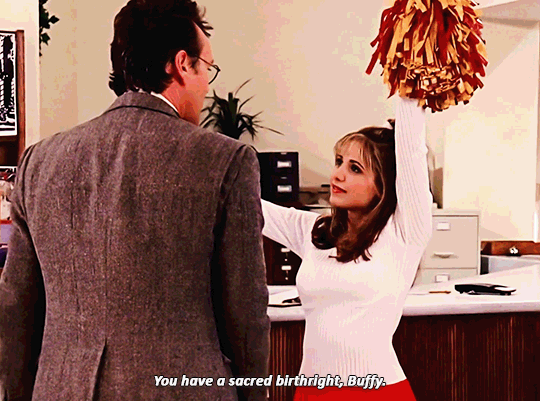
Giles is a Watcher. That's his job, and it's important to him. Buffy definitely shakes that up - wanting to have a life outside of slaying, bringing Willow and Xander into the fold, arguing with him - but she's still doing her duty as a slayer and Willow and Xander come to be useful with research so Giles goes along with it. But to all of the teenagers he's a mentor. Someone they look up to and rely on. He's the watcher/librarian - he's teaching them about the supernatural, training Buffy. But to Giles they are children that he feels responsibility for. Sometimes he appreciates their help, sometimes they irritate him beyond belief, often he's afraid for their safety and occasionally he enjoy's their company.
By the time Prophecy Girl has come around Giles clearly cares about Buffy as a person, not just his slayer. He's doing everything in his power to find a loophole in the prophecy, but he doesn't trust Buffy with the information, she overhears her death sentence. As the watcher he controls the information. Giles is willing to go in her place, which shows his devotion to her as Buffy, not just the slayer-in-the-prophecy.
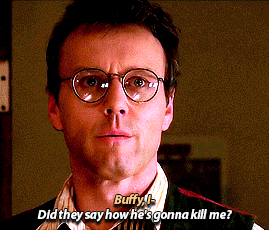
In Fool For Love in s5 when they're studying past slayers, Buffy can't find information on how the slayers died. Giles says that if they were like him, he would find it too painful to write about. So the close relationship between a slayer and her watcher is not unusual. Although, as seen in Helpless, it is monitored by the Watcher's Council in order to make sure it doesn't cross the line into being parental.
(which, sidenote, I think is one of the purposes of the Cruciamentum: kill off older/more independent slayers to make way for younger/more naive ones, assess the watcher-slayer dynamic and if the watcher does what they're told by the council, if the slayer survives the test it creates distrust/distance between her and her watcher, etc).
Throughout s2 it's also implied that Buffy thinks of Giles as more then just her watcher, not a father but somewhere in the mentor-coach-parental-figure capacity - like when he accompanies her at the end of Lie To Me and tries to cheer her up.
I think their relationship starts to become more familial in Innocence (when Buffy's 'personal' life, dating Angel, and her 'professional' life, being a slayer, collide catastrophically). Giles as Buffy's watcher is now in the position of having to guide his slayer into killing someone she loves for everyone's safety --- but he's also witnessing a girl he cares about being heartbroken and humiliated and afraid and Giles steps in to comfort her, not as her watcher but as the parental-like support she so desperately needs right now (and that she's not getting at all from Joyce).
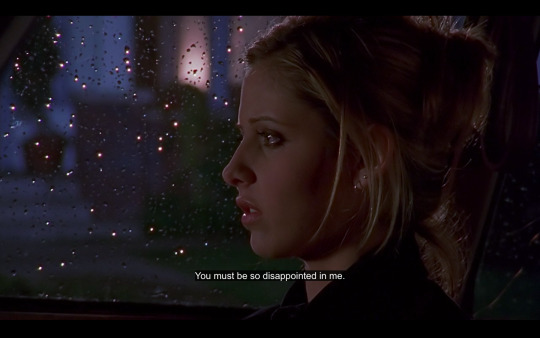
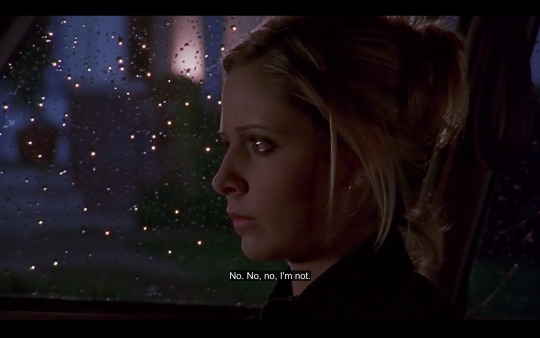
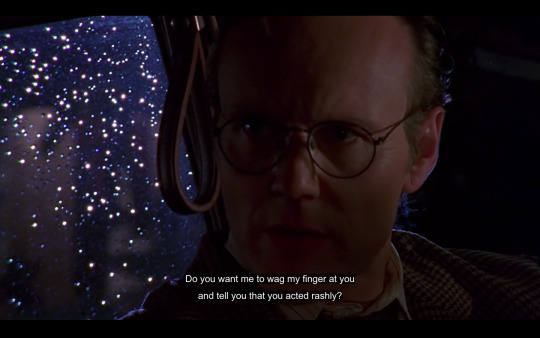
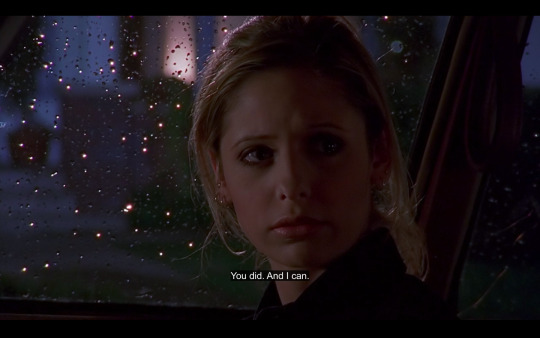
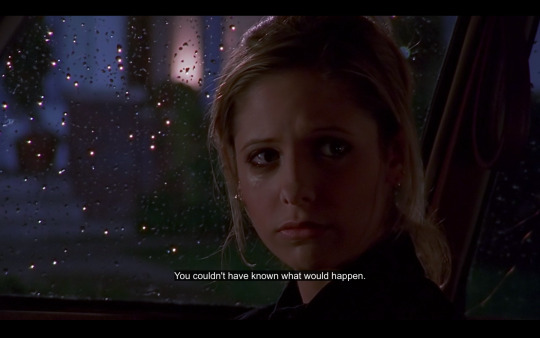
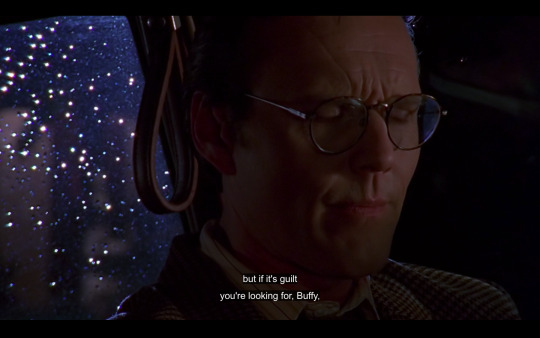
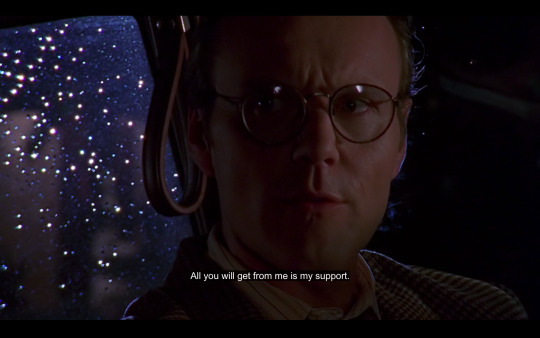
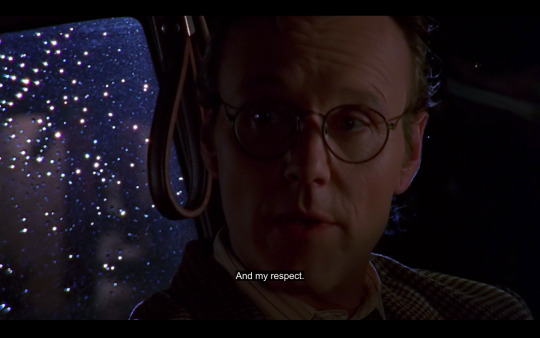
This is compounded by Jenny - who Giles broke of his relationship with in support of Buffy, who Buffy doesn't forgive but does accept because she wants Giles to be happy, and who Angel kills (not only to keep the soul spell a secret and to generally hurt everyone involved) to drive a wedge between slayer and watcher. Once again colliding their personal lives with their duties.
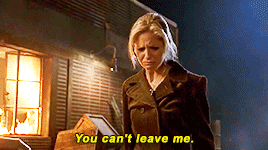
As for the rest of the Scooby Gang, now including Cordelia and Oz, they become a good team throughout s2, and in the finale it's their efforts that save Giles & bring Angel's soul back (even though it's Buffy the slayer who's left to kill Angel and save the world).
After Buffy goes MIA, Giles is constantly leaving Sunnydale to try to find her, and the rest of the Scooby Gang are left... in charge. Of keeping Sunnydale safe and manning the Hell Mouth. A bunch of teenagers without powers or supervision. I think that makes it pretty clear where Giles' priorities lie (in being a watcher, and looking out for Buffy). Still, throughout s3 it's also shown that Giles genuinely cares about these kids, even if he doesn't always know how to show it.
He wants to keep Xander out of danger in The Zeppo, he lets Oz stay in the library and helps keep watch over him during full moons, he's devastated when Willow has "become a vampire" and shocks the hell out of her by hugging her when he realises she's still alive.
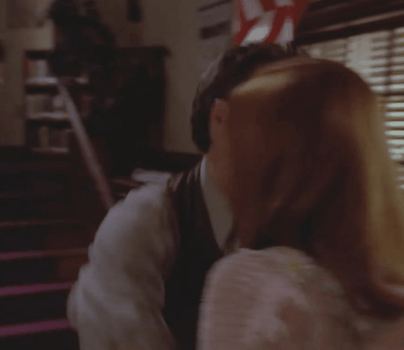
I won't go into Helpless (op already did that so wonderfully), but I will say that Giles is never a Watcher to Faith. Faith lost her watcher in a horrific way, and Giles becomes Faith's temporary watcher from Faith, Hope & Trick onwards. But we never see him training her, or caring for her, or even getting to know her. Faith is living in a seedy motel and struggling to pay for it and she has a sad mattress-duct-tape-punching-bag. Gwendolyn Post pretends to be Faith's new watcher and manipulates her to get the magic power glove thing, but we never see Giles checking in with Faith once it's over. He leaves that to Buffy?? Her peer?? Not the guy who's supposed to look out for her?? They only interact in group settings or if Faith and Buffy are out on patrol. It's no wonder the Mayor seemed like the better option, even before Wesley showed up.

Things start to change in season 4 - firstly because Giles has taken a step back. Buffy comes to him for help in tracking a gang of vampires and Giles... shuts her down. He says he'll always be there for her if she needs help, but that she's capable of doing it herself. He changes his mind by the end of the episode - wanting to help her (even though she's already done it herself with her friends help).
Buffy! I've been awake all night. I know I'm supposed to teach you self reliance, but I can't leave you out there to fight alone. Uh, to hell with what's right. I...I'm ready to back you up. Let's find the evil and fight it together! Great. Thanks. We'll get right on that.
Giles being out of both jobs, and the unofficial HQ of the Scooby Gang being at his apartment means that the team is very much involved in his personal life. Plus they do act more like a family - having Thanksgiving together, Buffy being embarrassed by Giles' halloween outfit or that he's dating someone, Anya and Xander bringing their lovers quarrels right into Giles' space without so much of a hello. There's awkwardness still, Giles not being sure where he fits or feeling left out - but that's happening between all the dynamics of the gang since they've changed.
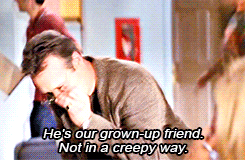
The clearest, straight up, Giles-is-a-father-figure moment that we get is in Something Blue, where Buffy asks Giles to walk her down the aisle, not because her dad won't be there, but because she wants Giles to do it. It's also important to note that before Giles remembers this was all brought on by a spell - he's elated. Spike also refers to Giles as "practically my father in law" and no one denies it.
youtube
Even despite the growing chaotic family dynamic in s4 that is mostly resolved by the finale, in s5's first episode Giles reveales to Willow that he's moving back to England.
He is getting everything together so that the Scooby Gang have all the resources they need to fight evil, he trusts Willow with this information, but he believes Buffy doesn't need him anymore. And... i guess the other's don't either??
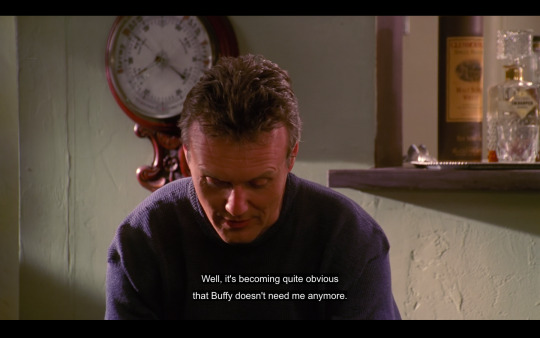

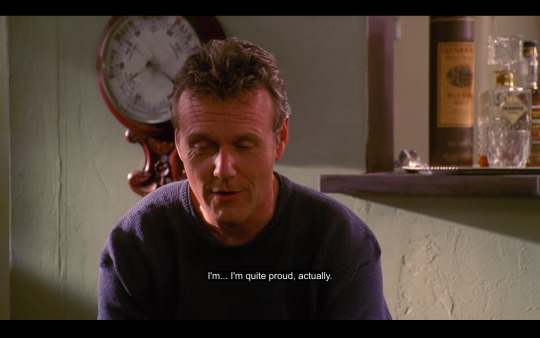
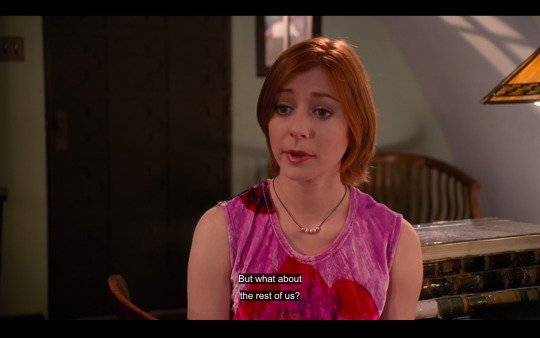
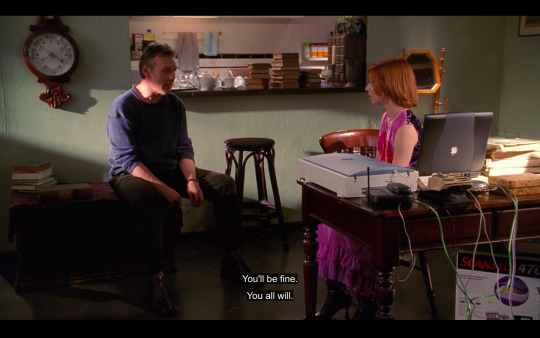
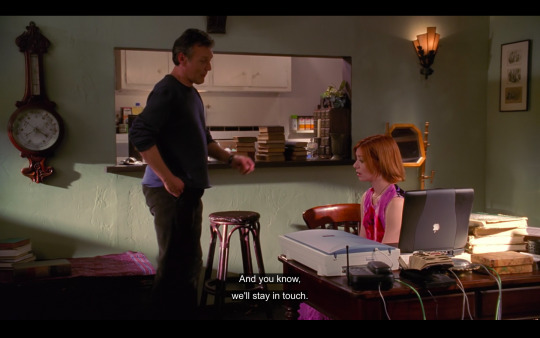
He only decides to stay when Buffy asks him to be her official Watcher again, to research and train and guide her like they used to.
Things start to shake up all the dynamics again - Dawn comes into it, creating issues between Buffy's home life / friends life / slaying life - and then Dawn being the key puts her at the forefront of Buffy's slaying life. Joyce gets cancer so Buffy moves home. And Giles is there to try and support her with both these things, but still. Like being the slayer falls on Buffy's shoulders alone, so does her family life.
Still, the whole team has officially become a family after... Family. Interesting that it's Tara, who's still a newcomer to the group (and doesn't really consider herself a true part of it) who's the catalyst for it. Her abusive family coming to try and take her away and the people she's found who care for her standing up to protect her and saying they're a family.
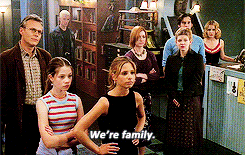
And they act like it too. Everyone's there to celebrate birthdays, Willow goes to Giles for advice after her and Tara's first fight, they patrol together when Buffy has family duties, they celebrate the holidays together with family dinners, everyone is always hanging out at the Magic Box whether there's supernatural stuff going on or not.
Giles starts to fit more into the protective father role - he threatens Spike to stay away from Buffy when the vampire won't take no for an answer, he stays with Joyce and Dawn while Buffy is out patrolling, Giles is going to the council for answers about Glory and the Key and then filling in Buffy and Joyce about Dawn.
And when Joyce dies, Giles is right there. Holding Buffy, at the hospital, going with the Summers sisters to the doctor to find out the verdict, and when Buffy is to overwhelmed to handle all the forms and decisions Giles steps in and does them (with Buffy's permission).
But there's always a distance.
Giles helps with funeral arrangements. But leaves after the funeral is over.
Dawn shows up at the Magic Box the next day looking to be distracted and Giles is happy to help her. But Buffy is drowning in not only grief but her fear of having to take care of Dawn by herself, and in having to take care of herself without her parent.
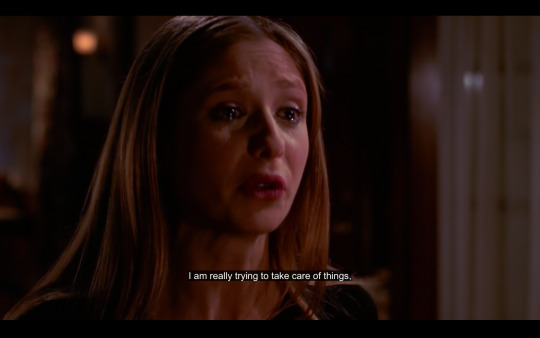
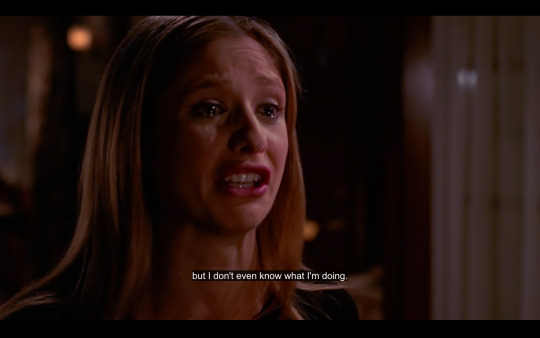

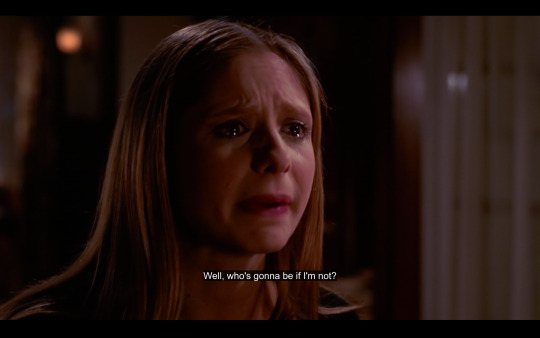
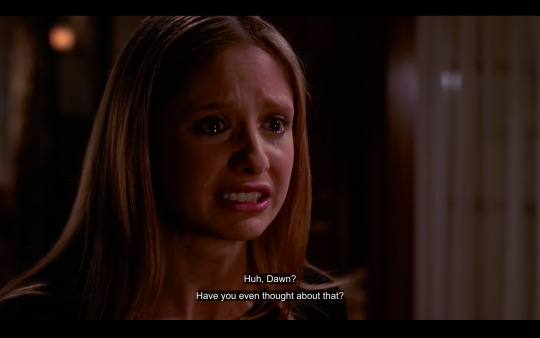
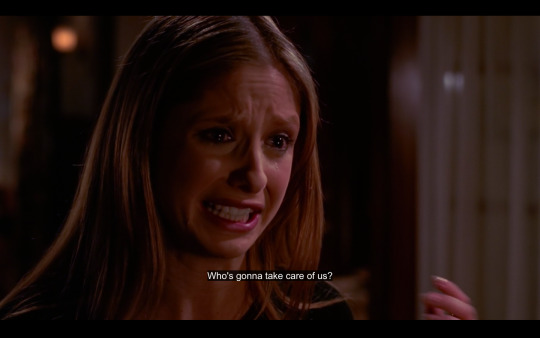
And Giles is there, he comes over to cook and they have dinner together. But when asking Buffy how she and Dawn are doing it's just "we're okay" and "some minutes are harder then others" and "we're getting into a routine". All Giles seems to know to say is that "it'll get better" and saying he thinks it's a good idea for Buffy to get back into their training schedule.
He's trying.
But he's still acting like the Watcher. A watcher that cares deeply, sure, but not a father.
Buffy's afraid that being the slayer is turning her into stone, that she's shut down and pushing people away. She tells Giles that she loves him, confesses that it's hard for her to say. And Giles... asks her if she's serious about this problem. He doesn't say it back. He gives her advice about a quest from the Watchers diaries.
Sure they are a family. They're all trying to help be there for Dawn, they all show up after Glory attacks Tara, they all go together in the Winnebago leaving no one behind.
But Giles keeps his distance.
What you did, was necessary. And what I've always admired. Being able to place your heart above all else. I'm so proud of you. You've come so far. You're everything a Watcher... everything I could have hoped for.
It was the perfect moment to say: everything a father could have hoped for. But he doesn't. He does make the distinction that he's not just her Watcher, but not more then that.
Maybe that's because he knows he has to make the tough calls. He has to advocate to sacrifice Dawn to save literally everyone else. He kills Ben to stop Glory. He does the hard things so that Buffy doesn't have to.
And after Buffy dies, Giles is there. Out on patrol with everyone.
But it's Willow and Tara that have moved in to take care of Dawn. Xander is the one driving her to school. Spike is the one staying with her when the others are busy. Giles is... packing up to leave. He feels like he failed. And it would be painful, being in Sunnydale without Buffy. But there are other people who are stuck in Sunnydale with haunted memories, still trying to keep it safe, and they rely on Giles and see him as family, much more so then at the start of s5.
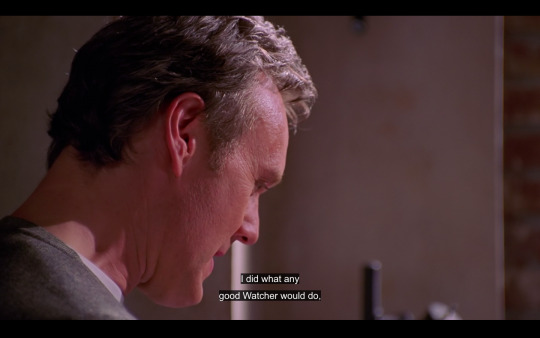
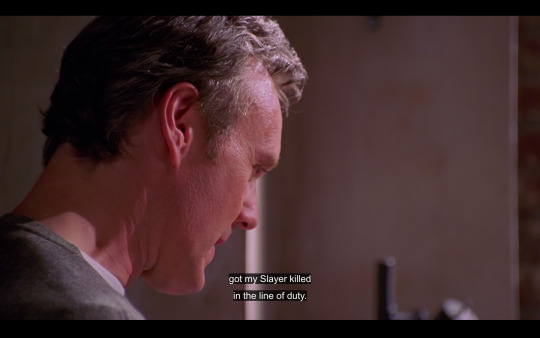
But Giles still leaves. Leaves the protection of the Hellmouth and the raising of a traumatised 15 year old to... also traumatised 20-somethings. And IN CANON this has gone a different way before. When Nikki Wood was killed in the line of duty, her watcher took in her son Robin and raised him. That's not what Giles does.
And he doesn't even say goodbye, just leaves a note and they race to catch up with him at the airport.
"I've gone. Not one for goodbyes, I thought it best to slip out quietly. Love to you all, Giles."
That doesn't seem like a stand up father figure to me.
Of course Giles does come back, after Buffy is resurrected. He tries to fit back in, he tries to help her with Dawn and with money.
There's the scene in Life Serial when a hungover Buffy is on the floor of her bedroom, and Giles comes in to sit on her bed. We've never seen him in Buffy's space before. He gives her a large amount of money to take care of things and pats her on the shoulder. And Buffy says it feels a little like having her mom back, and Giles diverts, makes jokes, saying he'd rather be a rakish uncle. But Buffy makes sure he knows how much it means to her.
"It makes me feel safe. Knowing you're always gonna be here."
But after the tender moment when Buffy leaves, Giles looks like this:
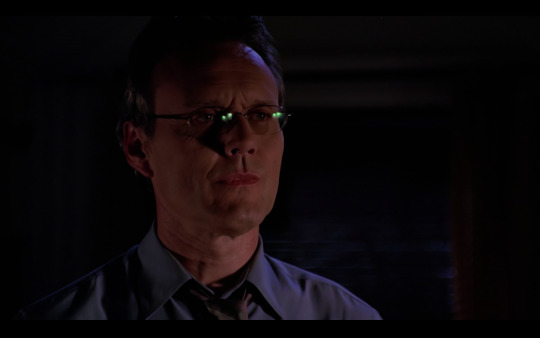
When Buffy begins to rely on him to parent and discipline Dawn, instead of talking with her about his role or saying he feels like that's something Buffy should do, Giles just... festers over it.
And even after finding out that Buffy was pulled out of heaven and is barely holding it together. That Willow is using too much magic and her and Tara have broken up over it. That Xander and Anya are engaged and excited about the wedding... Giles still leaves.
And he doesn't come back until there's mortal danger that he handles as a Watcher. The Scooby Gang might see Giles as a father or father-figure. But Giles does not want to be in the role of the father. Maybe he doesn't feel he will be capable of it, that they'd be better of with someone else (not that there are any other takers), or that it will conflict with his duties to keeping the world safe. As much as he clearly does love Buffy, Dawn and the Scoobies, Giles always puts distance between himself and them on a parental level.
It’s not until Season 3’s Helpless that the Buffy writers really started to lean into the idea that Giles is a father figure to Buffy. After Season 3, it comes up a lot, sure. It becomes a key part of his character. But it’s something of a retcon. It’s not exactly the role Giles plays early in the show.
(Yes, it’s possible to cast Giles as the parental figure of the Scoobies much earlier than that, and fandom often does. But I’ve never been entirely comfortable with that reading.
If nothing else, the first three seasons of Buffy the Vampire Slayer take place in a high school. It feels weirdly reductive to assume the only possible way an adult in this setting can interact positively with children is by acting as a parent. And early series Giles is not a parent. He’s a mentor. He’s a teacher.)
Partly that’s because, until Season 3, Buffy already has a father. Hank Summers doesn’t appear much, but when he does (in Season 1’s Nightmares and the Season 2 opener When She Was Bad) he seems cast in much the same mold as Buffy’s mom Joyce. He seems to be nothing more than a well-meaning parent who just doesn’t understand his daughter. Yes, we see in Nightmares that Buffy is worried that he might secretly resent her and not want to be around her – fears that, retroactively, will turn out to be true – but in that first episode those fears tell us much more about Buffy Summers than they do her father.
But Helpless sets up the comparison with Giles pretty directly, by firmly establishing Hank as a bad parent. Hank is meant to come and visit his daughter on her birthday, only to cancel his plans at the last minute. He does so because, as Joyce says, “his quarterly projections are unraveling and he can’t afford to take off right now”. He chooses his job over his daughter. Meanwhile Giles is meant to do his duty as a Watcher and send Buffy off powerless to fight a vampire as part of the Cruciamentum, even though this is likely to lead to her death. He doesn’t go along with it. He choose his daughter over his job.
And yet.
Well, I lied. That isn’t actually what happens in Helpless. Not exactly.
Giles does not choose his surrogate daughter over his job. Not consciously, anyway. He doesn’t refuse to drug her. To drug her repeatedly, even when he sees the effect it’s having on her. He doesn’t tell her about the Cruciamentum when she starts losing her powers. Even when he sees just how afraid she is. He doesn’t do anything but privately moan to Quentin Travers until after the vampire Buffy’s meant to fight escapes.
Then, yes, he tells Buffy about what’s happening. Then he confesses to what he’s done. But only because, as he tells Travers, “your perfectly controlled test seems to have spun rather impressively out of control”. The implication, surely, is that if the vampire hadn’t escaped, if the test had proceeded as the Council had planned, then Giles would have kept his silence, however reluctantly.
And even then, even while telling Travers that he doesn’t “give a rat’s ass about the Council’s orders”, a part of Giles seems to think he can do this and not risk his status as a Watcher. Rewatch the scene where Travers fires him. Giles is surprised. “On what grounds?” he asks, when Travers tells him he failed the test. He doesn’t think he’s done anything a Watcher shouldn’t do. He didn’t know that telling Buffy would cost him his job. He never does make that choice.
And that’s part of why I always get slightly irritated by fandom readings that uncritically cast Giles as Buffy’s Dad. About people who even sometimes act as though he’s a better parental figure than Joyce Summers. Because that’s just not supported by the text.
Yes, Giles clearly cares deeply about Buffy, and has done since the first season (witness his own fears in Nightmares, or his attempt to take Buffy’s place in facing the Master in Prophecy Girl).
He’s prepared to die for her, he’s prepared to kill for her. After being fired by the Council, when he's no longer her Watcher, Buffy's still clearly very important to him. Possibly the most important person in his life.
But he’s not a perfect father figure and he repeatedly treats Buffy really badly, even before copying Hank’s “shiftless absentee father” routine in Season Six. He lies to her, he hides things from her, he doesn’t trust her instincts. Even when she asks, he’s not prepared to take her to the Ice Capades. He repeatedly tries to distance himself from her. He’s not prepared to actually be her father. Even in Season Six's Life Serial, when Buffy offers him the role of substitute parent, he asks instead if there’s another part he can play: “is there some sort of, um, rakish uncle?”.
Yes, of course, Rupert Giles is a much more developed character than Joyce Summers – possibly the most developed character in the first three seasons of the show after Buffy herself. And yes, the audience are clearly meant to sympathize with him more than they are with Joyce. But I think it would be a mistake to think that this means the character of Buffy herself also feels this way. Giles is part of the story of Buffy the Vampire Slayer in a way Joyce isn’t, but equally Joyce is a fundamental part of her daughter’s life in a way that Giles never is. In a way he repeatedly turns down the chance to be.
(Just look at how often Buffy worries about her mother getting hurt or about having to do something that makes her mother disappointed in her. Think about how much Buffy's desire to be "normal" is tied up with Buffy wanting to be a daughter her mother would be proud of. Look at how much she misses her after she dies; how afraid she is that she never knew how much she meant to her. This is a constant part of Buffy’s characterisation, from the first season until the last.)
Giles is not the uncomplicated Good Dad that some of the fandom wants him to be. He never has been. He can’t possibly be that person, when his role in the narrative is to prepare Buffy for her destiny of dying young, alone in the dark, fighting monsters. And that’s a smart writing choice! It’s what makes Giles a good, compelling character.
The Giles that appears in the show is much more interesting to think about than the sanctified fandom reading which ignores or downplays his flaws. And I just think people should talk about that version of the character more.
#op i did not mean to write so much#i just have so many THOUGHTS about giles and his relationships with the scoobies - especially buffy#and i'm not against giles at all i love him and he's fascinating#but reading your post about how giles isn't just the watered down good dad to the group finally put into words something i'd been strugglin#to comprehend and then this happened.#btvs#btvs analysis#my meta
304 notes
·
View notes
Text
Buffy is a radical heroine precisely because she refuses to conform neither to the stereotypical femininity imposed on female protagonists nor to the hyper-masculine mold that dominates the classical hero’s journey. Yes, she carries the archetypal weight of a traditionally male-coded role: she’s the Chosen One, the one on whose shoulders rests the fate of the world, the one who must confront the ultimate evil, the one expected to sacrifice her life—repeatedly—for the sake of the greater good. But what makes Buffy subversive is that she inhabits this role on her own terms, and through it, exposes its contradictions.
Unlike the classical male hero —who usually embraces his destiny with stoic detachment or egotistical bravado— Buffy resists it. She doesn’t want to be the Slayer. It’s not a romanticized quest for glory. It’s a burden. And that resistance, that refusal to glorify suffering or noble sacrifice, is profoundly political. Because Buffy doesn’t accept her role out of fatalism or legacy: she accepts it as a conscious ethical position. She chooses, with full awareness of the cost, to save others. Not because it makes her exceptional, but because she refuses to let anyone else carry the pain she knows too intimately.
What’s even more radical is how she does it: without amputating her emotions, without repressing her pain, without adopting the affective coldness that stories have historically rewarded in male heroes. Buffy doesn’t perform strength through detachment. Her power is explicitly emotional. Her vulnerability is not a weakness to overcome: it is a weapon. She continues to love, to feel, to break down, to rage, to mourn and all of that is framed not as a flaw, but as a source of power. She is not strong despite her emotions, she is strong through them.
This is where Buffy directly confronts the patriarchal foundation of the “hero’s journey.” She doesn’t just challenge the damsel-in-distress trope (though she absolutely obliterates it) she also rejects the masculinized “girlboss” fantasy that demands emotional sterility as a precondition for leadership. She is not a woman in a man’s role. She reshapes the role itself. And she does it while never losing sight of what matters: not honor, not destiny, not recognition, but people. Buffy is not guided by ego, nor by duty to abstract ideals. Her compass is rooted in care, in community, in love.
She’s not a knight on a noble quest. She’s not even interested in heroism as a myth. She is a Slayer. A worker. A survivor. And by embracing that, she collapses the romanticized masculinity of the classical hero and rebuilds it from a place of collective responsibility, emotional truth, and moral clarity. That is her revolution.
#i fucking live her#really#she was my fave as a child and now rewatching the show as an adult i love her more#buffy summers#buffy the vampire slayer#buffyverse#Buffy meta#Buffy summers meta#btvs meta#character analysis#gender roles#women in media#Buffy
173 notes
·
View notes
Text
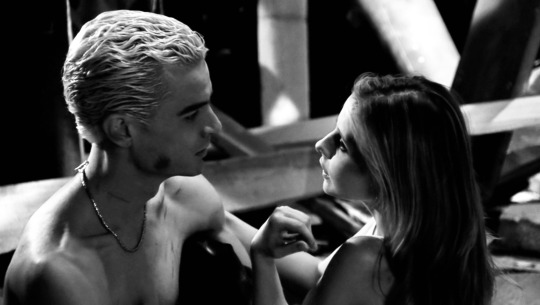
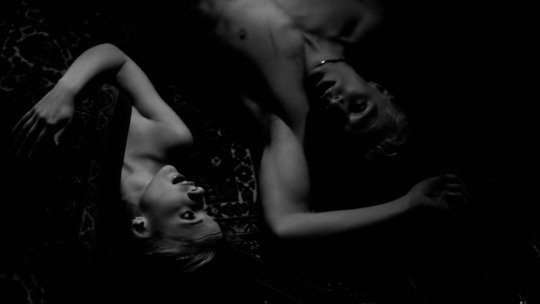
Forgive me, but I HAVE to let it out on here because there's no other place than Tumblr, where anyone would ever understand how my mind and body reacts to this kind of situation (being obsessed with fictional characters and their romantic relationship). I'm letting it all out, because I haven't been this crazy about a fictional character since the death of Sybil Branson in 2012. It's safe to say BtVS is making me INSANE. I still have season 7 to watch and don't worry, I don't care about spoilers usually so I already know how it's going to end. But I also can't watch it yet; I need to take a serious break for the sake of my health... However, I need to write my heart out, like NOW. I don't care if my analysis is not aligned with canon knowledge. These are mere feelings, and I also happily block out every cruelly written stupid scene that isn't in line with this beautiful ship(wreck).
Why can't we just preach it from the rooftops that Buffy is in love with Spike, even and especially in season 6. She doesn't believe he's able to feel true love towards anyone, which is why she would never admit hers, not even to herself. She's also traumatized by her previous romantic endeavour with a vamp, who happened to go completely nuts because of loving her. That fucks a girl up, I tell you. Plus the whole "I tasted sweet death and now I'm full of impenetrable (almost; pun intended) cosmic melancholia" affects her behaviour, obviously. Spike is the only one who understands her Thanatos (psychoanalysis babes back me up). Spike is the only one who she can be brutally wild, carnal and insanely strong with without hurting him or breaking his bones. And he can be like that with her. She can be fully herself with him, all sides, dark and violent included, something she perhaps couldn't safely be with her latest, human boyfriend. It terrifies Buffy to have these feelings of lust and affection towards something soulless, which is why she sees her sexual behaviour as reckless and self destructive. And there is a disruptive aspect to it, sure - him being a bloodthirsty vampire and all - but she continually seeks him out from pure desire. Emphasis on pure, something Buffy thinks a soulless being could never be. Ironically, their dark, feral bond happens to be just that: pure as what it is. A revelation, as Spike said. They have much deeper connection than "only" a sexual attraction. It's primal yearning. It's love in its deepest, scariest depth. Like death itself, but a little one.
#hahah okay now that I have written it all out I feel much better#I'm obsessed with Spike's storyline in terms of Buffy and I'm not gonna apologize#GOD I love Tumblr sometimes#there's no other outlet in the world where I could yap this kind of insane feelings-based analysis about a fucking vampire tv show honestly#yes you can psychoanalyze me in the light of this post... but I wouldn't recommend it#posted#btvs#Buffy the Vampire Slayer#Buffy Summers#Spike#buffyverse#Spuffy#Buffy x Spike
216 notes
·
View notes
Text
the whole peculiar situation with "why does everybody in this house think i’m still in love with spike?" consists of the way buffy phrased it and the fact that she even said it unprompted. not because nothing led to it in the conversation, but because it was so rushed and so defensive and so i-didn`t-even-register-what-i-just-said. it burnt and bothered her all that time. and it leaves buffy shocked that it was the first time she said it like that, confirming that the love was and is there. it`s not her usual "i can`t love you", "you can`t love me", it`s her mouth finally betraying her iron control and spilling what`s been on her mind - she said it to try and blame the others in their false assumptions and in turn it revealed to her the truth that she so hard tried to bury down and ignore at all cost, the truth that she probably avoided to think is now pronounced out loud, making it even more real to her.
and to her it`s not the time and she probably doesn`t want it, cause we all know - buffy summers is the most repressed character ever. each year stakes become higher and higher and she has to jump over her head to stop the end of the world, and she is just in her early 20s, and she died already 2 times, the second one hitting harder, and she tries to regain control over her life and not let the fire inside her disappear again, and she has to look after her sister, and she has to constantly prove herself, and take care of responsibilities that shouldn`t be hers, and everybody picks on her, and it`s the end of the world again. for the past 2 years she hasn`t had much time to simply breath, to be.
and then there is spike and she just doesn`t have enough energy to unpack it all, but he is there and he loves her the way she has always wanted to be loved and cherished, he loves her good side and her ugly side that only he truly saw, he loves the way nobody was able to do or wanted to do. and when such love is there, she is not ready for it, cause trust issues, cause he is a vampire (again), a vampire without a soul (which helps her to run away from any feelings that start to bloom for him), but then he gains his soul for her and now she feels relief that maybe it`s possible for them, she can openly care for him now, but now it`s not the time to love.
however, it is time for love, it`s always about love. btvs is a love story and i stand by that. buffy heals herself and her relationship with herself, her trust with herself, her confidence, her love for herself. but trust is the most important one here. she can finally feel the begining of that relief and that is why she slips and says that phrase.
#don`t take it seriously i`m not the one for a good analysis#i dont even know what i said please forgive me and ignore this rant lmao#it should`ve been shorter but i`ve been thinking again and again about “still” and here we have it#there is nothing new and other people probably said it more eloquently and coherently#if anybody was able to understand this mess thanks for your hard work lol#btvs#buffy the vampire slayer#spuffy#buffy summers#spike btvs#spike
129 notes
·
View notes
Text
What I enjoy so much about Angel's curse as a plot device is how it works to expose who he is as a person and call up questions about what it means to be good or evil.
The intent of the curse was nothing but punishment. Angel would be forced to feel the guilt of everything he'd done, and if he ever let go of the guilt enough to experience pure joy, it would all be stripped away from him. It wasn't about giving him a soul so that he could be a better person, it was all just to maximize his suffering. And well, it does a pretty damn good job. For almost a hundred years, Angel spent his time wallowing in guilt and misery. He wasn't contributing anything to the world, but he wasn't taking anything away from it either (unless you count the rats he was eating). Until Whistler comes along and shows him a glimpse of Buffy Summers, and suddenly his life has a purpose again.
In the first season and a half of Buffy, Angel tries to actually do some good for the first time in his life. He makes the choice to use his abilities to help people, and it changes everything. He lets himself fall in love with Buffy, and as a side effect he concentrates more on the positive potential of his future than the shadows in his past. Turning evil is his punishment for allowing himself to be happy, and it exposes the hypocrisy of the original curse. Guilt and punishment was effective in keeping Angelus out of the world, but it's also what brought him back. Angel lost his shot at joy, and so did Buffy and Giles and Jenny and all the others. It's such a good representation about how punitive justice cannot lead to positive change. Arguing that his past crimes make him unworthy of any hope just leads to him going back to his wicked ways. If he'd been allowed to be happy, the Scoobies wouldn't have lost one of their most powerful allies and the world wouldn't have been nearly swallowed by Acathla.
Having a soul was never meant to be a reward. It wasn't supposed to be a shot at redemption, but he found his way to Buffy and was redeemed anyways. The hundred years of sitting around being sad did a lot to shape who Angel is, but it didn't motivate him to try and be better. It was Buffy that made him genuinely strive for a brighter future and save hundreds of lives along the way. It wasn't guilt that made him a good man, it was hope.
#it's very easy to say that feeling guilt is proof of morality#but frankly i'm more interested in what characters do with their guilt#i am simply gnawing on the fact that angel used his soul to become a hero#which goes directly against the stated purpose (punishment)#he's supposed to be miserable but how does misery help anyone?#also i haven't watched angel the series yet but it's next on my agenda#anyways i'm always thinking about 3.10 “amends”#i love it when angel is confronted with the fact that he's never once been a man worth saving and yet buffy wants to save him anyways#he doesn't need to prove that he was good in the past#he just has to try to do better in the future#buffy the vampire slayer#btvs#angel btvs#buffy summers#bangel#my analysis
132 notes
·
View notes
Text
the more i think about Liam/Angelus/Angel, the more i think that he just never learned how to process emotions like a normal person.
he started drinking to drown out his problems (probably his feelings, really) when he was a young adult (either very late teens or early twenties) and then he became a soulless monster when he was 26, so he tended to kill/torture people instead of feeling things.
then, he gets cursed with a soul, and he learns that no amount of alcohol drowns out almost a century and a half of hurting and killing people.
so, sober and endowed with a conscience, he still has absolutely no clue how to deal with any of his emotions. because he stopped even trying to do that back when he was young.
so, yeah, he’s emotionally stunted and stuck with the mentality of an alcoholic man in his early twenties. it puts a lot of his behavior when he’s with Buffy into perspective, actually.
anyway, this turned out longer than i expected. i might post more analyses on Angel’s actions (specifically, right now, i’m thinking about why he killed his sister. do not tell me it’s just because he was evil.)
#uh oh ats made me like angel a lot#if this just becomes an angel blog#you can’t blame me#but like if anyone ever wants an analysis on any member of the whirlwind#PLEASE lmk#angel btvs#buffy the vampire slayer#angel the series#btvs#angel#angelus#angelus btvs#liam btvs#liam ats
71 notes
·
View notes
Text

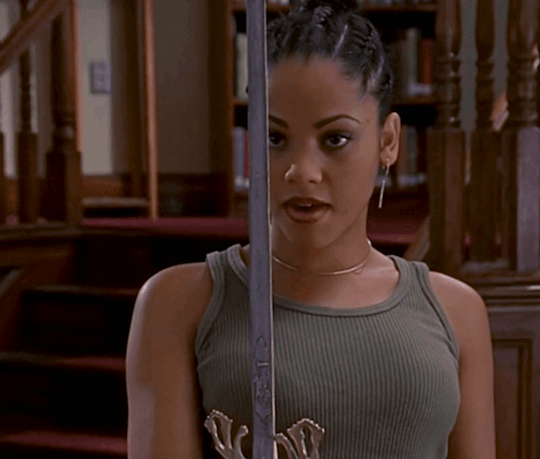
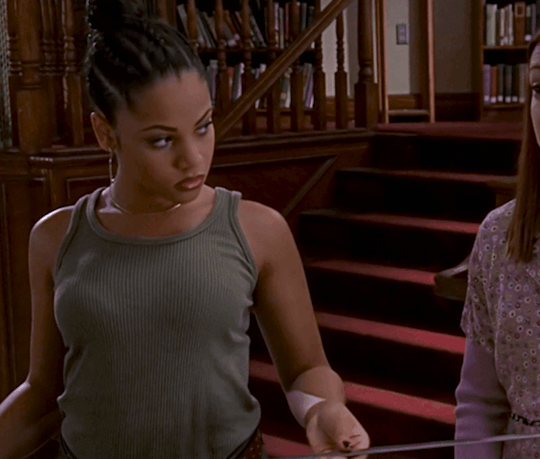
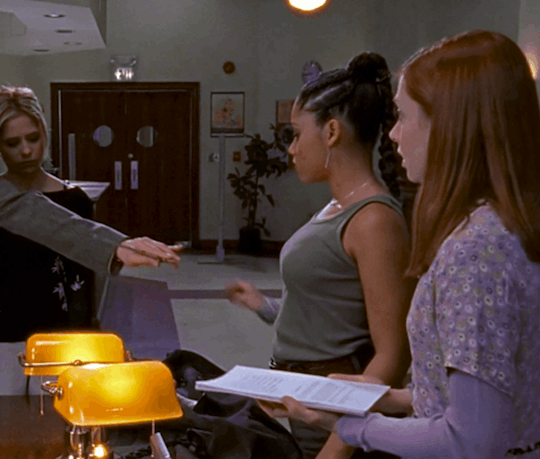
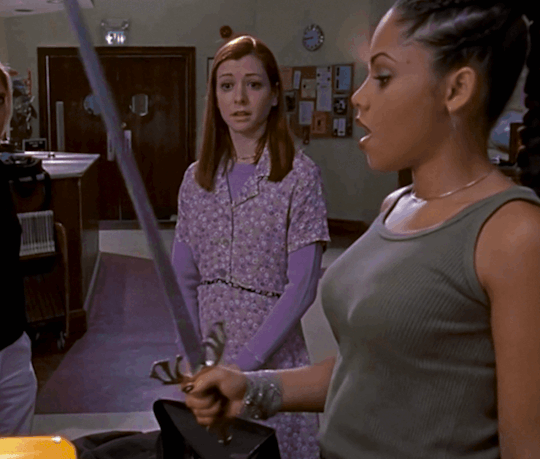
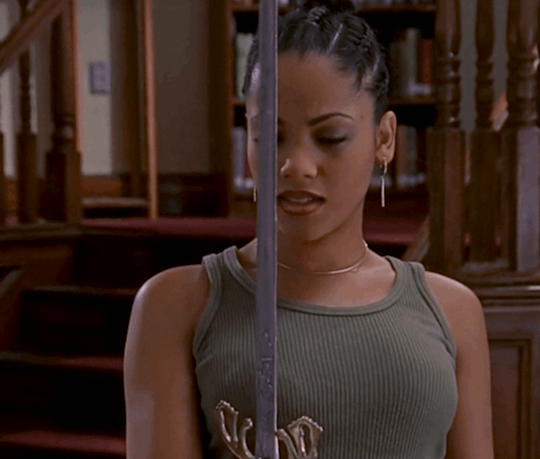
Kendra with a sword
#kendra young#kendra btvs#btvs#buffy#buffy the vampire slayer#honestly they should have sent her to kill angelus it would have solved all their problems#<-- for literary analysis purposes YES i understand why that would have been much worse for the plot obviously#but in universe things might have ended better#gifs#gif i was a cowboy
146 notes
·
View notes
Text
The Gender Narrative - from Buffy the Vampire Slayer to A24
Alright so I know this topic has probably been explored to hell and back (pun intended), but a transgender lens reading of Buffy the Vampire Slayer has beckoned me for years; and seeing I Saw the TV Glow yesterday was probably the last push I needed to get this out in writing. As we know, the film features a fictional television show heavily inspired by BTVS - and the framing highlights the same aspects I've wanted to dissect, so let's dive into it.
Spoilers under the cut!
Throughout its run, and despite its imperfections, BTVS drew much of its messaging from 90s (and early 2000s)-era feminism. Buffy's presentation as a sparkly, pink, girly girl is central to her character and her destiny. She is an icon of what girls can do and accomplish, even with the whole world against them - and, in this context, it is absolutely, startlingly captivating that her personal life revolves around a perpetual struggle for her right to girlhood.
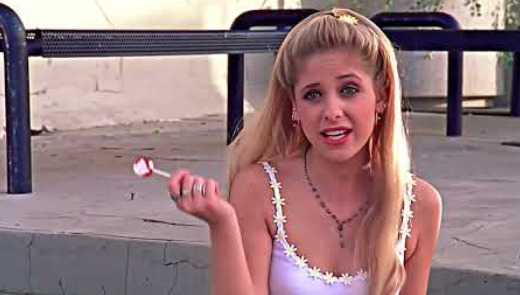
Despite being the picture-perfect blonde Valley Girl on the surface, Buffy often finds herself barred from that existence by her Slayer identity. She is consistently perceived as too strong, too capable, too aggressive, too independent, too dangerous - and, ultimately, too masculine to participate even in the most stereotypical milestones of a girl in high school. Still, that experience is what she craves the most; so she signs up for the cheer squad, she loves shopping, she runs for Prom Queen, and she goes out slaying in a halter top, with perfect bouncy curls. In essence, Buffy Summers is desperate to pass - which takes us to ISTTG and the root of its story.
The two main characters of ISTTG - "Owen" and "Maddy" - are obsessed with a popular YA series, The Pink Opaque; which, between its credits font, its girl power themes, and monster-of-the-week format, is demonstrated to be an in-universe parallel to BTVS. The Buffy equivalent - or, the pink, pretty, sensitive, and powerful Isabel - is a point of utter fascination for "Owen."
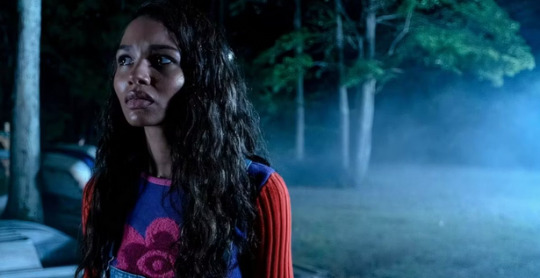
there are no good stills of her online yet please forgive me
She is everything he wants to be, everything he is meant to be; and the time he spends with "Maddy", wearing a pink dress, a pink ghost drawn on the back of his neck, the pink glow of the TV vivid on his face, is the only time he feels anything approaching to happiness or peace. The very first sequence of the film establishes that "Owen" barely responds to his own name, that his father is a walking threat of what society commands him to become, and that his mother is loving but distant. Even later on, when he apparently has a "family of [his] own", we never even see their faces. Within the context of his life, he is little more than a ghost, going through the motions; and as the story goes on, it is revealed that "Owen" is Isabel, trapped in a false reality by Mr. Melancholy, the Big Bad of TPO. Her heart was carved out, she is drugged, and buried alive; and the sound of her slowly choking to death overlays "Owen's" steadily worsening asthma.
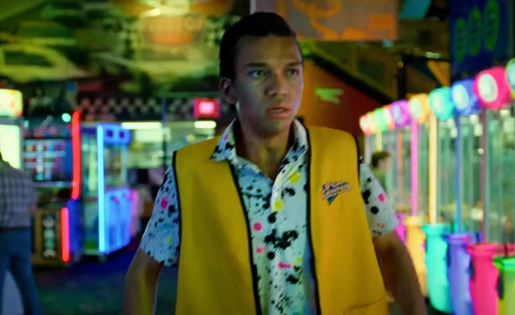
There is no denying the truth of that alternate existence by the end of the film. "Owen's" life is a nightmarish suffocation. Isabel is dying from a life of a boy she never was - in what is, explicitly, a transgender narrative.
The same story is directly mirrored by "Maddy."
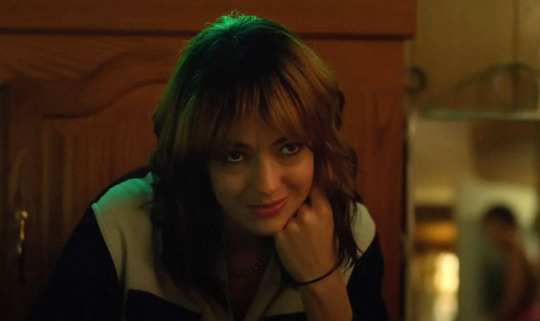
Within the premise of ISTTG, she is the similarly trapped and suffocating "Tara"; or, the second half of the Pink Opaque - who, over the course of the film, discovers the truth of their reality, returns to the world of the TV show, and then comes back, unwilling to leave Isabel behind. However, what is particularly notable is that while her character's name is, of course, an homage to Tara Maclay (made all the more obvious via Amber Benson's cameo), the "Tara" of TPO is nothing like the soft-spoken, pastel-wearing witch.
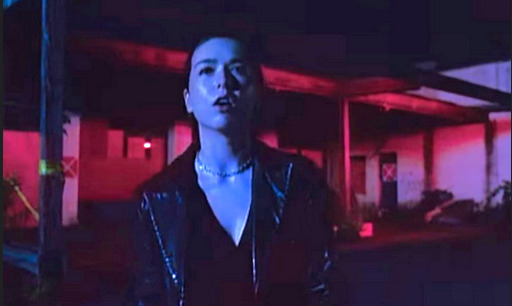
Instead, she is a bold, loud punk with slicked-back hair and a leather jacket, who snarks at the monsters-of-the-week and speaks in poetry - she's Spike; and that provides the basis for her dynamic with "Owen" throughout the film.

In the world of BTVS, Spike is largely presented as a foil to Buffy's character. He is her thematic (and extremely sexually compatible) opposite; and that extends to his own relationship with gender. His story arc is defined by his struggle to be perceived as a man; on the Watsonian level, it is an identity persistently overshadowed by his vampirism - and in the Doylist sense, his poetry, occasional eyeliner, and painted nails might have something to do with that situation. Regardless, it is a significant factor in his narrative, both before and after his original, human death - to the point where he bonds with Buffy's mother, Joyce, specifically because she "treated [him] like a man"; and in the context of ISTTG, the same themes extend directly to "Maddy." In S5:Ep7 of BTVS (Fool for Love), Spike states that "getting killed made [him] feel alive for the very first time" - and when "Maddy" returns from the world of TPO, she explains that the only way to survive what Mr. Melancholy had done to them was to bury herself alive and die in the false world. Her statement is a monologue of slam poetry, spoken without interruption and illuminated by the steady blue of a high school planetarium; and while "Owen's" experience of blue lighting is usually aggressive and abrasive, "Maddy's" is soothing. It is right. It ties directly to what she is meant to be, even as her story inevitably terrifies "Owen" - who, much like Buffy, is not yet ready to face the truth of who he is or allow himself to indulge the desires he's buried for all his life.
From what I understand, the finale of the film has proven to be divisive; some interpret it as hopeful, others as crushingly bleak - but as a BTVS fan, and a trans man myself, I cannot see it as anything other than a peak of sheer, overwhelming panic that is only experienced at the very precipice of Change. My reason for it is rooted in the parallels between the respective season 5 finales of BTVS and TPO. For Isabel and "Tara," the story ends with their apparent defeat at the hands of Mr. Melancholy; and Buffy's ends with her sacrificing herself to save the world. She dies. She is buried. And then there's season 6. As such, inevitably, "Owen" is going to accept the truth of himself; he is going to die, Isabel is going to claw her way out of a grave - and when she does, only one person is going to understand what happened.
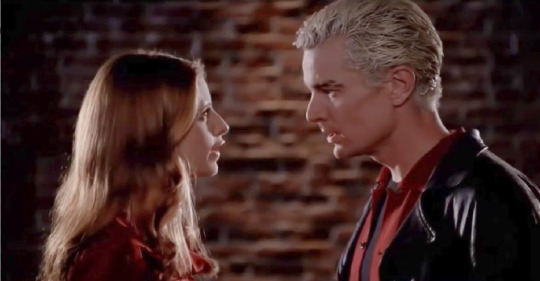
In conclusion - they are T4T. To me. And to Jane Schoenbrun, I suppose.
#i saw the tv glow#buffy the vampire slayer#isttg#i saw the tv glow spoilers#i saw the tv glow analysis#btvs#spuffy#spike btvs#william the bloody#buffy summers#film analysis#jane schoenbrun#a24#a24 films#a24 movies#btvs spike#btvs rewatch#queer film#queer lens
246 notes
·
View notes
Text
regardless of how you feel about spuffy -- and there are a myriad of different ways one could feel about spuffy -- i do not understand why anyone would look at the last scene buffy has with spike and decide that actually we should take notoriously unreliable narrator spike's word about how buffy feels over buffy's. just feels like a really strange approach to take when analyzing the main character's journey and emotions. But That's Just Me I Guess
#*i mean ok i do understand why from a shipper perspective but from a serious analysis perspective i don't get it .#buffy the vampire slayer#buffy summers#btvs#it's what you do afterwards that counts#i'm gonna be a fireman when the floods roll back
51 notes
·
View notes
Text
i know that cordelia is meant to be a foil and a mirror image to buffy and what her life could’ve been without her calling (and cordelia showing envy at certain moments that buffy even have a calling and therefore a meaning for her life) but
I wish they explored the mirror image thing with other characters cus they all have history that predates buffy stepping foot in sunnydale.
One of my favorite is cordelia in angel 1x22 and willow in btvs 6x22, both find themselves in a situation where they have to feel the pain of the entire world and thats when you see the contrast in their reaction. The power hungry wallflower thinks its better to destroy the world and put an end to all’s suffering and the coming of age arrogant vapid mean girl makes her mission to help the people to lessen that pain. It might seem cavalier and just a way to make the plot move forward as the writer wanted but its also a great representation of their character. It feels almost natural atp that the science nerd who has had to rationalize her feelings to cope with them who finally accessed her full powers after breaking from a big loss that represented for her what she wanted to become as an adult would decide that finishing it all would be better and a more direct solution than the altruistic and unattainable idea to help everyone around the world that the overtly confident adult who just found her purpose takes on the matter.
Its both a representation of their selfish needs/wants but also a clear reflection of the personality they were during their formative years and how it still defines them after they have changed as characters.
I like that people who have known each other most of their life off screen but don’t have that much history still get to mirror each other in surprising ways from when we met them, it feels fated and right.
79 notes
·
View notes
Text
If I had a nickel for every time I was obsessed with a show that featured a groundbreaking queer ship, and also featured, as part of the main trio of friends, a witch named Willow, who begins as a horrifically bullied, shy, nerdy wallflower, and ends as one of the most insanely powerful spellcasters in the show, who is canonically queer, and who has at some point been shipped with a scrappy blond boy that has an affiliation with Wolves… I’d have two nickels.
Which isn’t a lot but it’s weird that it happened twice, you know?
#Is it just something about the name ‘Willow’ that automatically reads as a shy wallflower who gets picked on and also reads as Witch#there are so many paralels to Willow from the Owl House and Willow from Buffy the Vampire Slayer#toh fandom#the owl house#the owl house analysis#owl house#toh#toh willow#willow toh#willow the owl house#the owl house willow#owl house willow#willow owl house#willow park#huntlow#hunter x willow#willow x hunter#btvs#buffy the vampire slayer#btvs willow#willow btvs#willow and tara#willow and oz#willow rosenberg#buffy willow#willow buffy#buffyverse#buffy meme#the owl house memes#the owl house season 2
27 notes
·
View notes
Text
Imagining a Byler scene in season 5 parallel with this scene with WILLow and Xander (in Buffy The Vampire Slayer)
youtube
Context for the Uninitiated
Buffy the Vampire Slayer is not just a supernatural teen show about fighting vampires. It’s a deeply character-driven series that explores grief, trauma, friendship, growing up, and what it means to be human.
By the end of Season 6, the group of friends known as the “Scooby Gang” is fractured, emotionally worn out, and traumatized. Buffy (the Slayer) has come back from the dead and is dealing with depression. Willow, the group’s sweet and nerdy witch, has become addicted to magic and spiraled into a darker, more dangerous version of herself. And Xander, the “normal” one — no powers, no special training — has felt increasingly useless in a world of gods, demons, and superheroes.
Then comes the season finale, titled "Grave."
What’s Happening in the Scene
Willow has just suffered an unbearable personal tragedy: her girlfriend Tara was suddenly and senselessly killed. Overwhelmed by grief and corrupted by magic, Willow absorbs dark, ancient powers and essentially becomes Dark Willow, a nearly omnipotent being hell-bent on destroying the world — not out of evil, but because she’s in such pain that she wants to end all suffering by ending everything.
As Willow is literally summoning the power to tear the world apart, Buffy is helpless, and everything seems lost.
Then, Xander shows up. Alone. No weapons. No magic. No fight.
The Emotional Core: Xander’s "I love you"
Xander doesn’t try to battle her. He doesn’t try to reason with her with logic or threaten her with force. He simply stands in front of this god-like, furious, grieving version of Willow — and tells her:
“I love you.”
Not romantically. Not to manipulate her. Just purely, unconditionally, as a friend.
He reminds her of their childhood, of silly memories, of the simple love and bond that has existed between them since before all the monsters and magic. And he keeps repeating, as she lashes out at him, that if she wants to destroy the world, she’ll have to kill him first — because he’s not leaving. He’ll die with her. He won’t let her be alone in her pain.
And slowly, the more he says “I love you,” the more Willow — buried deep beneath the dark magic — starts to crack. She stops. She breaks down in tears. And in that moment, she returns to herself.
The apocalypse is averted. Not through violence. Not through magic. But through love — platonic, stubborn, selflesslove.
Why This Scene Is So Powerful
It subverts the genre. You expect a magical battle. A big heroic showdown. Instead, you get something more human and intimate.
It centers emotional truth over spectacle. Xander saves the world not because he’s strong, but because he’s kind.
It gives value to “ordinary” people. Xander is the one without powers, often comic relief. But here, he becomes the hero — proving that heart and empathy are just as powerful as slaying monsters.
It redeems Willow. She isn’t defeated — she’s reached. Her pain is seen and held.
It’s the culmination of years of friendship. The moment only works because of six seasons (+ childhood friendship) of deep connection between these characters.
In Summary
In a show about fighting literal demons, the most powerful weapon turns out to be love. Xander saves the world not with a sword, but with his heart — and by refusing to let his best friend be consumed by pain and darkness.
It’s one of the most moving and unexpected climaxes in genre television — and a testament to how Buffy the Vampire Slayer always found magic in the most human places.
Now how this could be parallel to Byler in Stranger Things ?
Based on everything we know about Stranger Things, especially the deep emotional core of Mike and Will’s relationship — and interpreting it through the lens of Byler as endgame — here’s how a scene echoing the Buffy Season 6 climax (Xander saving Willow) could work beautifully in Stranger Things Season 5.
This is a creative breakdown and narrative pitch that aligns with the show’s tone, mythology, and emotional trajectory — and shows how Mike saving Will with a love confession could be cinematic, heartbreaking, and world-saving all at once.
By Season 5 (coming soon), it’s clear that Will Byers is deeply connected to the Upside Down, Vecna, and all its horrors — emotionally, psychically, and possibly physically. He’s also carrying years of repressed love, guilt, and loneliness, and his feelings for Mike — long hinted to be romantic — remain unspoken but heavily felt.
The new teaser shows Will potentially being haunted or manipulated by Vecna again. That sets up a perfect opportunity for the Buffy-style emotional showdown — where instead of defeating the monster with force, the key is love (like it was already the case in season 2 to bring Will back).
Everything I'm going to write next is just theory and hypothesis, I'm just taking inspiration from the Willow and Xander scene and projecting it onto Byler based on the Stranger Things universe and their story
The Setup :
It’s the final battle. Vecna is attempting to fully merge the Upside Down with the real world, using Will as a vessel, a psychic link — maybe even possessing or fusing with him.
Will is gone. Trapped in a nightmare, consumed by darkness. His body might still be there, but his mind, his soul, is somewhere else — drowning in the Upside Down's hive mind. The others are fighting monsters, chaos is erupting, but Mike pushes past them. Because he knows the real fight isn’t physical.
It’s Will who holds the balance. If they lose him, they lose everything.
The Emotional Climax
Mike approaches Will, who is levitating, eyes black, caught in a storm of supernatural energy. Everyone else has failed to reach him. But Mike steps forward, trembling, desperate, scared — and starts to speak.
Not a speech to the villain. Not a battle cry. But a confession.
“Will… I know you’re in there. I know you can hear me. It’s me. It’s Mike. I’m here. I’ve always been here — I just didn’t see it before. I didn’t understand.”
He gets no response. Will is still lost, possessed or dissociating, tears possibly falling but eyes blank.
Mike steps closer, voice breaking:
“You said you felt like a mistake… like you didn’t belong. And I didn’t say anything. I let you think you were alone. But you’re not. You never were. I just—I was scared. Of what it meant. Of what it meant about me.”
Lightning flashes. Vecna’s grip tightens. The world is on the brink.
“I love you, Will. Not just as my best friend. Not just as the guy who’s always been there. I love you. And if the world ends here, if this is it — then at least you’ll finally know.”
He steps into the storm, into the chaos, into danger — not to fight, but to reach Will.
“I’m not leaving you. If you fall, I fall. If you’re lost, I’m lost too. But if there’s even the smallest part of you left in there… take my hand. Come back to me.”
The Payoff
There’s a long pause.
Then — just like in Buffy — Will begins to cry.
A small crack in the storm. Then more. And then, he screams — maybe not in pain, but in release — and all the darkness explodes outward. The bond breaks. The psychic link collapses. Vecna’s grip shatters.
Mike pulls him into a hug, sobbing. The world begins to heal. The gates close. And Will is finally, finally home — not just physically, but emotionally. Seen. Loved. Chosen.
Why This Would Be Epic & Meaningful
Narrative symmetry: The show started with Mike trying to find Will. It ends with him finding him again — in the deepest, most intimate way.
Emotional truth > physical power: Like Xander saving Willow, it’s not powers or fists that save the day — it’s love, vulnerability, connection.
Queer catharsis: Will’s journey has been steeped in queerness and repression. To have his love be the key to saving the world is revolutionary in a genre show — and earned.
Mike’s arc comes full circle: From a boy who couldn't understand emotions to a young man brave enough to say “I love you” when it matters most.
Subverting tropes: It would shift the final battle from cliché monster fight to something deeply emotional — still epic, but profoundly human.
In Conclusion
If Stranger Things Season 5 ends with Mike saving Will with a love confession, it won’t just be cool — it’ll be one of the most powerful, iconic, and emotionally satisfying finales in modern TV. Like Xander and Willow in Buffy, it would prove that the greatest strength isn't magic or weapons — it’s love. The kind that sees you, saves you, and says:
“You’re not alone. Not anymore.”
Okay it's corny, cliché and cringe but I'm not a writer I have no inspiration, I'm just a delulu desperate to having more season 5 content for having more analysis and theory to do and who is dying of impatience be kind to me lmao
#stranger things#byler#mike wheeler#will byers#byler endgame#stranger things analysis#stranger things theory#mike wheeler analysis#byler tumblr#buffy the vampire slayer#willow rosenberg#xander harris#buffy season 6#btvs#stranger things 5#will byers theory#vecna#power of love#Youtube
29 notes
·
View notes
Text
There are lots of examples of when the creators of a thing are like, we want to do middle-of-the-road eye candy, but also, we like to front that we're better than that? so here's a flimsy excuse for why Actiongirl McBadass has to look like / would totally choose to dress like that, that is frankly more insulting than if we'd just said yes we know it's unrealistic but sex sells ¯\_(ツ)_/¯
But, Buffy the Vampire Slayer actually isn't that. Sure, it's an American TV show so you definitely have the whole nondiagetic makeup, all women with a BMI over 19 were banished in the Purge thing going on, but on this one occasion, they actually did write a character who would go out to fight vampires in kitten heels and lipgloss.
Not "because being so sexy is distracting to her enemies" or some bs, but because she's desperately trying to cling to a sense of self that her destiny is at odds with, and that's an important source of conflict and point of interest for her as a character, especially early on in the show.
And while we can absolutely critique the hell out of the image she's attached to*, it makes perfect sense that she's attached to it. She kinda won the lottery looks-wise especially given her time and place, and she will have gotten attached to the idea of everything her society told her that could mean for her - being the Ideal American Girl, the cheerleader! - and the fate she's been handed is so dismal, and she's so young. And it's not like (as with a lot of the examples I would criticise) she chose this life either, which makes a big difference imo. In real life, a woman who is in an Actiongirl role due to say her career choice comes preselected for willingness to put her hair in a fucking ponytail so she can fucking see who she is fighting.
Anyway Buffy is good. I mean it's not in all the ways it's not, but also, it is.
*just off the top of my head - there are the racist undertones of the idealisation of the Blonde as the "All-American" ideal of feminine beauty, the normcore elevation of blandness, the misogyny of how everyone agrees she's got to not intimidate men physically or intellectually, the very fact that it's incompatible with dressing sensibly for physical activity or defending oneself, the class stuff around the clothing side of it, the way this image of femininity is at least partially built on tearing other women down as falling short in one direction or another - too weird, too ethnic, too slutty, too prudish, too smart, too tacky,etc etc....
29 notes
·
View notes
Text
Buffy the Vampire Slayer uses character foils to give the audience a better understanding of Buffy and her unique situation. A foil is a character who contrasts with the protagonist to highlight specific qualities they have. Foils can show the protagonist’s strengths, flaws, and potential avenues for growth.


Cordelia is popular, lively, and at times shallow. Her life is similar to the one Buffy had before she became the slayer, and it emphasizes the difficulties of Buffy’s role. Cordelia is often shown to be dealing with the issues of a typical teenager, while Buffy is facing life-or-death situations. In the episode Nightmares, the fears of everyone in Sunnydale come to life. Cordelia’s worry about the way her peers view her contrasts with Buffy’s fear of being buried alive and becoming a vampire. This gives the audience perspective on just how stressful Buffy’s situation is and allows them to empathize with her when she misses having a normal life.


Kendra, another vampire slayer, is extremely disciplined and reserved. She always fulfills her duties according to the rules. She’s the epitome of a traditional slayer. Buffy relies on instinct, creativity, and help from friends to get the job done. This contrast shows how different Buffy’s approach is compared to the average slayer. Besides that, when the two first meet, they view slaying in completely different ways. To Buffy, it’s a job that she’s forced to deal with. Kendra believes that being a slayer is a fundamental part of who she is. This demonstrates how far Buffy is from fully accepting her role.


Faith is a slayer who uses her power for gain and personal satisfaction. This highlights Buffy’s sense of duty and strong morals. Unlike Buffy, Faith doesn’t have a support system to fall back on, but the show doesn’t use this to excuse her behavior. In an episode titled The Wish, the characters are in an alternate reality where Buffy never came to Sunnydale and didn’t meet her friends. She’s closed off and cold, but still fights for the side of good. The audience sees that while Buffy would be unhappy and a less effective slayer without support, she would still be championing for others. She has an innate compassion that doesn’t come naturally to Faith. Faith has allowed herself to be corrupted by power, a path Buffy could fall into if she’s not careful.


#btvs#buffy the vampire slayer#buffyverse#buffy summers#character analysis#character dynamics#faith lehane#cordelia chase#character foils#writing
22 notes
·
View notes